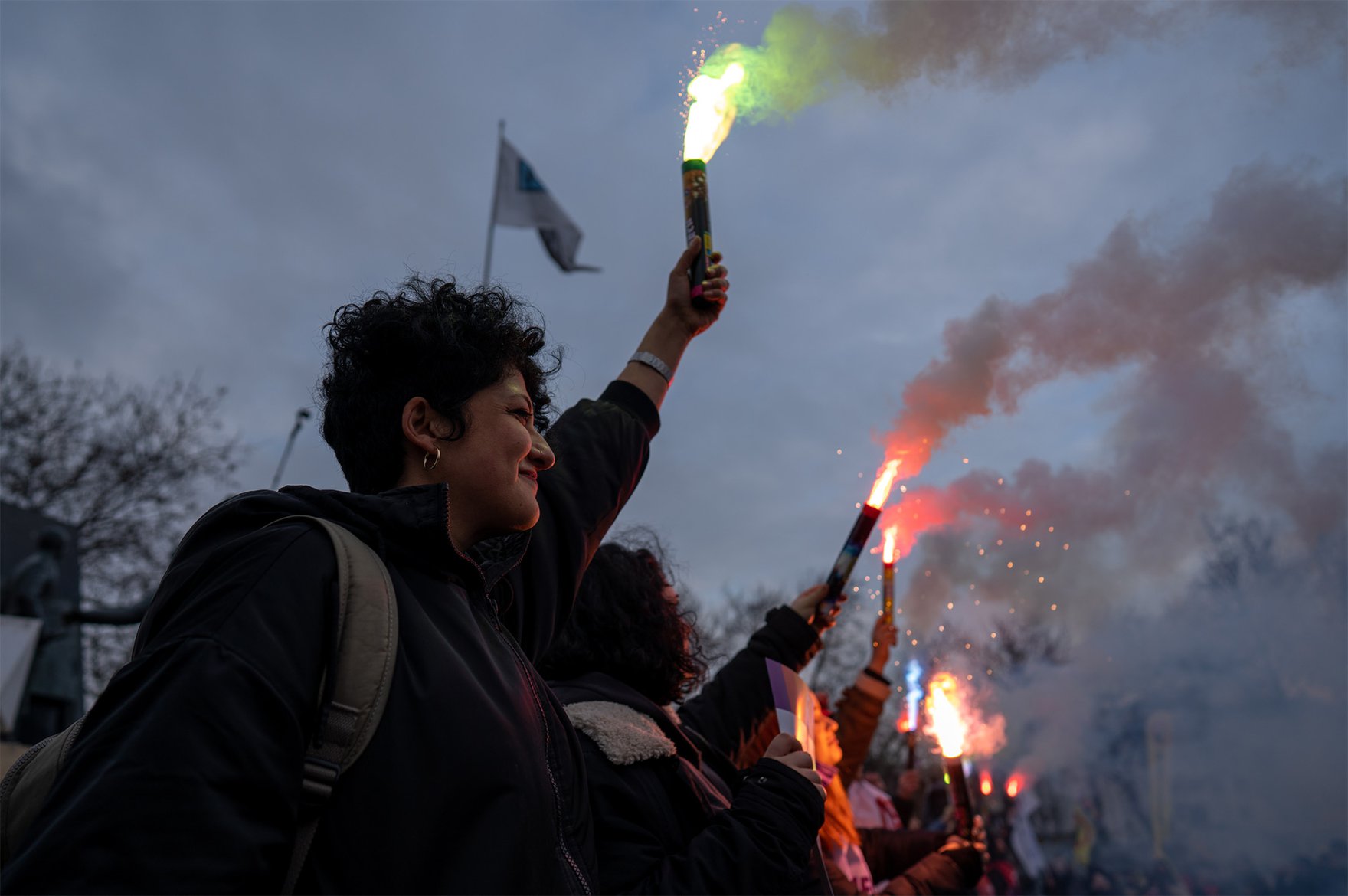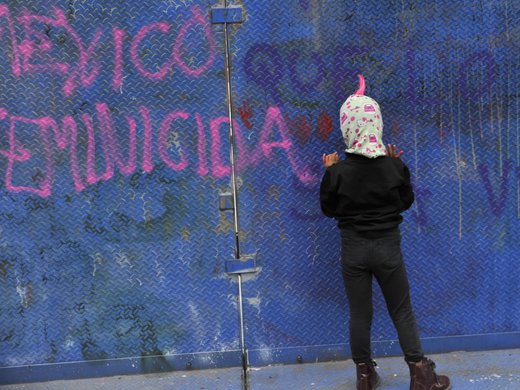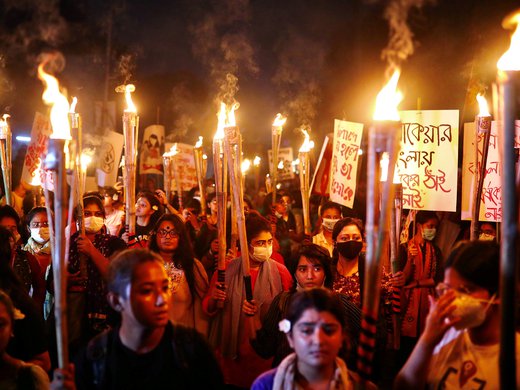“We know that technology does not determine society,” explains the sociologist Manuel Castells; “it is society. Society shapes technology according to the needs, values, and interests of people who use the technology.” Consequently, technology is not gender neutral. Indeed, information and communications technologies (ICTs) have provided yet another space where gender-based violence spreads.
Digital technologies are how and where power is fashioned and embedded. The individuals and organizations that shape politics use ICTs and social media as tools and spaces in which to be heard. Scholars mapping research in gender and digital technology say that at their inception, ICTs were regarded as tools “for the realisation of women’s right to development, through livelihoods, health and information delivery, education, information services, networking and advocacy, e-governance, and the amplifying of women’s voices and perspectives.”
But while female politicians, activists and journalists, and women’s movements such as #MeToo and #NiUnaMenos have used online spaces to challenge monopolized discourses, these spaces have also become additional arenas for women to be harmed. The nature of the harms varies and continues to evolve. Women may experience harassment, impersonation, stalking, disinformation, sexual slurs and images, doxxing, threats of rape, deepfakes and surveillance.
The perpetrators are well aware of the effects on women. Their aim is to discredit, discourage and silence women, to “frame them as untrustworthy, unintelligent, emotional/angry/crazy, or sexual.” Indeed, as the UN Special Rapporteur on violence against women, its causes and consequences has recognized, rather than seeing the offline and online worlds as separate spaces, they must be viewed as a continuum in which problems such as misogyny, patriarchal norms and gender-based violence continue to hold sway.
Worse, the business model and algorithmic design of social media platforms will often amplify the threats, meaning that digital technologies can be weaponized to persecute, control, silence and surveil women in insidious ways. Women who speak out publicly are not safe from threats, even in the confines of their homes.
Around the world, women are feeling the effect of the malicious relationship between digital technologies and violence. Female journalists and politicians are particularly at risk, according to a landmark report by Amnesty International. In India, trolling has become an integral part of political life, including as a result of the actions of Prime Minister Narendra Modi’s “troll army.” In Russia, feminist activists have been the targets of online threats and slurs. Other examples include Brazil, Hungary, the Philippines and Rwanda. Canadian politicians and journalists are not immune, according to a recent report.
Yet despite the mountain of clear evidence that women are disproportionately targeted online, violence against women is often trivialized. Tech companies and policy are slow to react. Which is why activists and organizations worldwide are increasingly taking concrete action to make ICTs that are not only safe for women but work for women. International Women’s Day provides an opportunity to highlight the important work of women from different parts of the world who are striving to make digital technologies safe for women of all races, ethnicities, religions and sexual orientations.
Patrícia Campos Mello: The Journalist Taking on Jair Bolsonaro
In 2019, Brazilian journalist Patrícia Campos Mello faced an aggressive online harassment campaign following her reporting on then-candidate Jair Bolsonaro’s use of the chat tool WhatsApp during the 2018 presidential elections. Following the allegations, Bolsonaro’s supporters threatened her on social media and over the phone. In 2020, during a congressional hearing on fake news, a witness attacked her reporting and accused her of being willing to trade information for sex. The testimony launched a new harassment campaign against Campos Mello, which included President Bolsonaro, his sons and his closest allies accusing her of spreading lies. In her 2020 book, The Hate Machine: Notes from a Reporter on Fake News and Digital Violence, the award-winning reporter shed light on the impact of disinformation on Brazil’s political landscape, as well as in countries such as the Philippines and Hungary.
The book shines a light on the nature and impact of the OGBV Campos Mello experienced. She was attacked both as a journalist and as a woman: the smear campaign was emblematic of an existing culture of misogyny in Brazil, as messages contained sexual slurs, memes, rape threats and slanderous videos accusing her of being a prostitute. The aim was to destroy her reputation, both as a journalist and as a person.
Campos Mello’s is not the only such case in Brazil. When I spoke to her recently, she told me that threats against female politicians and journalists are now part of Brazil’s political life. Because the president and other political figures are themselves at the source of OGBV and gendered disinformation, such actions have become normalized: “It’s not even that it’s tolerated now,” she said. “It is promoted.” The impact on Brazilian women’s personal and professional lives is real, she said. There is no self-censorship, but female reporters may think twice before publishing certain articles as they consider the risks, including for their children. The situation in Brazil is a good example of what happens when autocrats use gendered disinformation to eliminate their critics: democracy suffers.
Campos Mello did not deliberately choose to raise awareness of this scourge. At first, she refused to speak out or engage with her trolls. In 2020, however, the threats intensified as the president’s allies used her case to mobilize supporters. This time, Campos Mello judged that if she remained silent this attitude would become normalized. She sued Bolsonaro’s son and won.
Although OGBV remains a problem in Brazil, Campos Mello says that when she spoke out, other women did as well. In this sense, it was a victory for women’s empowerment. She believes that mobilizing women’s organizations to combat OGBV is essential. Indeed, one of the main challenges throughout her ordeal was the attitude of platforms. When Campos Mello tried to report the harassment to Facebook, she was met with refusals to take action. In 2020, the pressure put on Twitter and Facebook forced the companies to act. Mello still believes that, considering the volume of threats, harassment and disinformation, social media companies do not invest enough staff and tools to combat these harms. She argues that the pressure must continue because it is the only language tech companies appear to understand. “We all know this is not freedom of expression. This is hate speech and character assassination.”
More women, from former Canadian federal cabinet minister Catherine McKenna to Namibia’s First Lady Monica Geingos, are speaking out.
Lucina Di Meco: The Political Activist behind the Term “Gendered Disinformation”
As a political activist, Lucina Di Meco experienced firsthand the horror of being targeted by vile and sexist content, including insults and obscene threats. What made things worse was the lack of response from social media companies when she reported the abuse. In my conversation with her, she told me that she was often met with dismissal or patchwork approaches. Di Meco took matters into her own hands and sought to provide concrete evidence of the negative effects that social media can have on women leaders and on democracy. She is the woman behind the term “gendered disinformation” — “the spread of deceptive or inaccurate information and images against women political leaders, journalists and female public figures.”
For her report entitled #ShePersisted: Women, Politics & Power in the New Media World, Di Meco interviewed dozens of women politicians, activists and journalists from around the world about their relationship with social media. She was overwhelmed by the amount and nature of abuse and gendered disinformation they faced compared with their male counterparts. While the report emphasizes that social media provides important spaces for women’s political engagement, the platforms’ business models thrive on inflammatory and attention-grabbing content, including sexism, harassment and threats. The #ShePersisted research emphasizes the negative impact on women’s political ambitions as they are discredited and made to feel afraid. The study, much like reports by Amnesty International and others, provides much-needed data that could open the eyes of tech companies and policy makers.
Mobilization and research are finally bearing fruit, Di Meco believes. One year after Di Meco first coined the term, Nobel Prize winner Maria Ressa described gendered disinformation as one of the crucial new threats that need to be tackled for the sake of democracy and human rights. More and more women, from former Canadian federal cabinet minister Catherine McKenna to Namibia’s First Lady Monica Geingos, are speaking out. Like Campos Mello, Di Meco says women’s and women-led organization are coming together to hold big tech companies accountable through awareness campaigns, television ads and more. She believes that organizations need to adopt a savvy strategy toward social media platforms, and avoid falling into their trap of half-hearted promises, PR stunts and false dichotomies. The road is still long, and organizations must become bolder in exposing social media platforms’ harms and in demanding better digital platform standards. As Di Meco says, “Women’s rights are the litmus test for human rights and democracy, and wherever they are under attack, we know that democracy is really at risk.”
Neema lyer: Her Team and Pollicy
A glance at the executive suites and boardrooms of social media platforms and other tech giants makes one thing very clear: the industry remains dominated by white males, with a North American and Eurocentric bias. This has implications for the users of digital technologies, including women in the Global South. Pollicy is an East African feminist technology collective that has taken on this problem. Its founder, Neema Iyer, told me that “for so long, we’ve had to accept foreign knowledge systems as the truth as well as foreign technologies and values systems, and to work within these constraints.” Her team wants to understand how women across Africa experience the internet, how technology impacts their lives and how they can co-imagine potential futures that work for the needs of African women.
Pollicy’s study, Alternate Realities, Alternate Internets, conducted across five African countries, showed that women are leaving online spaces due to experiences of abuse. Of the 3,300 women interviewed, one-third had experienced some form of online violence. The report highlights that attacks on women are rooted in misogyny, racism, sexism and other societal beliefs about how women should behave. In an upcoming study conducted with Muslim Women Human Rights Defenders, Pollicy found that visibility online for these women was a significant threat to their professional and personal lives.
The continuum of violence from the offline to the online world is clear: women decide to remain silent or change their behaviour online. According to Alternate Realities, Alternate Internets, 15 percent of respondents deleted or deactivated their accounts after such an experience, and another 12 percent stopped using the platform or service where they experienced online violence. Another study conducted in Uganda showed that female politicians use social media less than their male counterparts and are almost entirely absent from Twitter as a result of abuse they’ve received. What does this mean for Ugandan democracy?
Another main conclusion of Pollicy’s various studies is that women still don’t know where to access information on online safety or where to turn for help. Alternate Realities, Alternate Internets emphasizes that authorities don’t properly respond to complaints (when complaints are made) and that existing laws (when they exist) do not work for women. The trivialization of OGBV is particularly significant in Africa due to the digital gender gap, the absence of specific legislation and strategies, and the lack of interest and resources that social media platforms invest on the continent.
In response, Pollicy developed an interactive fiction game called Digital Safetea based on a storyline of three characters who represent different archetypes of African women. As players step into the world of the characters, they are faced with digital threats, including Zoom bombing, impersonation and even revenge porn. Players learn how to navigate these threats and are directed to websites and tool kits. As part of International Women’s Day, the organization also launched the Digital Ambassadorship Program in universities across East Africa in an attempt to bridge the digital gender gap through training and mentorship.
Iyer and her colleagues believe that progress has been made over the past two years. More organizations in Africa are launching new projects or conducting research on algorithmic harms, data privacy issues and misuse of surveillance technologies. The Pollicy team believes there is still a significant need for more resources, feminist action and South-South cooperation, especially since social media companies still don’t view Africa as a significant market. Pollicy is striving toward a cyberfeminist future that “offers a space for feminist thinking to critique, imagine and recreate a radically open internet” — including a space for African women, Iyer says.
Toward a Feminist Internet?
Pollicy, the #ShePersisted initiative and the actions of Campos Mello, as well as tools such as ParityBOT and Equality Labs, are part of a growing mobilization of women and women-led organizations working toward making ICTs safer for women of all identities, breaking the continued divide that intersects gender along the lines of religion, race, ethnicity and sexual orientation. The road has been arduous. Founded in 2006 by Jac sm Kee and the Association for Progressive Communications, Take Back the Tech was one of the first collaborative global campaigns that recognized the extent of OGBV and embraced it as a legitimate issue within women’s rights movements.
Take Back the Tech saw access to and control of internet technologies as being critical to the advancement of women’s rights and the transformation of unequal power relations. The realization that violence against women was happening online prompted the organization to call on women to respond to tech-related violence by harnessing the transformative power of tech, by making it their space. The culmination of this movement is the development of the Feminist Principles of the Internet, a set of 17 principles related to access, movements, economy, expression and embodiment.
Lack of political will continues to be the main barrier to the realization of a feminist internet and reclaiming of the emancipatory potential of ICTs. Governments, international agencies and, most importantly, private tech companies, must make concrete efforts to dismantle the gender-based violence that is endemic to digital technologies. We can count on activists and women-led civic tech organizations to demand more action from developers and decision makers as they take matters into their own hands. Their efforts must be celebrated. But they shouldn’t have to wage this battle alone.



